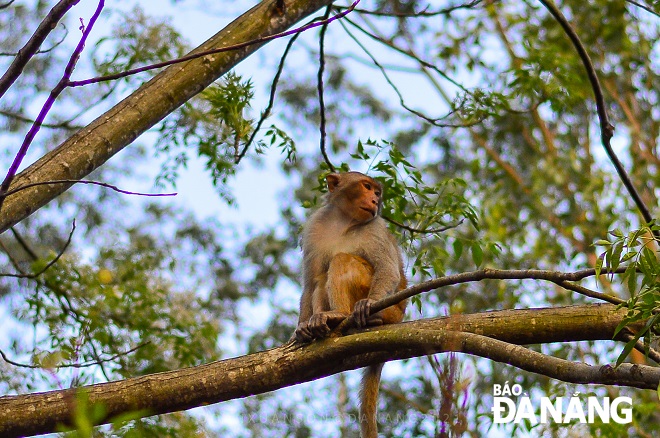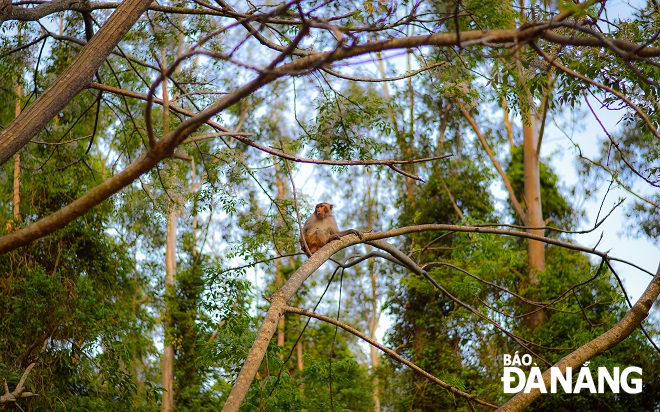Da Nang volunteers exert efforts to protect monkeys on Son Tra Peninsula
A group of tourists stopped their motorbikes in front of the Doi temple area on the Son Tra Peninsula where Rhesus Macaque monkeys usually gathered, then pulled out a bag of fruit to feed these wild animals. However, this action was quickly stopped by a team of volunteers there.
 |
| A Rhesus Macaque monkey living on the Son Tra Peninsula |
Le Kha Thien, one of the volunteers participating in the monkey protection drive on the Son Tra peninsula, said: “It is a common occurrence here, and our mission is to warn local residents and tourists against the harmful effects such monkey feeding and teasing behaviors”.
Working as a mobile phone repairer, Thien is one of the pioneers actively responding to the appeal of the Management Board of the Son Tra Peninsula and Da Nang tourist beaches to keep monkeys, and the wildlife as a whole on the peninsula, safe.
“That monkeys get injured and then spill onto the roadway to seek food from humans is attributed to the lack of awareness of a part of neglected tourists. Therefore, I decided to join the volunteer group because I think this is a practical job to limit such an act of animal feeding”, Thien said.
According to Deputy Head of the Management Board of the Son Tra Peninsula and Da Nang tourist beaches Phan Minh Hai, the unit recruits 10 volunteers aged 19 - 35 to work at such certain places where tourists often feed monkeys as in front of the Linh Ung Son Tra Pagoda, in the Doi temple area, and the Hoang Da (Wild) restaurant (300m away from the Linh Ung Pagoda.
Currently, there are 8 volunteers participating in the monkey protection drive, and the working time is divided into two shifts: 9:00am-11:00am and 3:00pm – 5:30pm.
| Volunteer Le Kha Thien in white T-shirt) asking a resident not to feed monkeys in front of the Doi Temple site |
During the recent peak tourist season, a herd of wild monkeys have been frequently spotted to gather at the landfill behind Linh Ung Pagoda on the Son Tra Peninsula, scavenging for food.
The monkeys are not afraid of humans. They are often seen scavenging in dumping sites for leftover food, or running after visitors and snatching their bags.
It is concerning that both locals and tourists visiting the peninsula have used candies and fruits, and other types of food to lure these monkeys into a position where they can be photographed.
In fact, feeding monkeys creates many negative effects to both animals and humans.
The habit has led to the primates’ decreased ability of seeking food in nature and increased their dependence on people to fill their stomach, which is not really good for their digestive system.
Tourists have accidentally changed the survival instinct of the younger generations of monkeys on the Son Tra Peninsula, when mother monkeys taught their children to beg for food from visitors instead of finding things to eat in the woods.
Besides, that tourists lure or tease the animal with food also makes them become aggressive, hereby increasingly attacking people.
The volunteers have always used mobile loudspeakers to visitors to warn them against the negative consequences of monkey feeding, especially the fact that primates get used to being fed rather than finding food on their own in the jungle.
 |
| The active engagement by the community is expected to contribute to preserving and protecting monkeys on Son Tra Peninsula in the coming time |
When asked why to join this monkey protection campaign, all the volunteers said that their love for the nature and wild animals on the peninsula inspires them to work very enthusiastically and conscientiously regardless the hardship and unfavourable weather, thus helping enhance the high sense of public responsibility in preserving the environment and conserving the wildlife there.
Along with the deployment of the volunteer group, the Management Board has taken strong measures such as working closely with other relevant local agencies to make patrols to detect and timely prevent the act of monkey feeding, placing warning boards and banners about the harm of such a concerning deed.
The rhesus macaque is listed as Least Concern in the International Union for Conservation of Nature (IUCN)’s red list of threatened species.
The 4,400ha Son Tra reserve is home to more than 1,300 red-shanked douc langurs – an endangered primate species listed by IUCN – and more than 1,000 plant and 370 animal species including 15 flora and 25 fauna species listed as the most threatened species in the world.
By XUAN SON – Translated by A.T